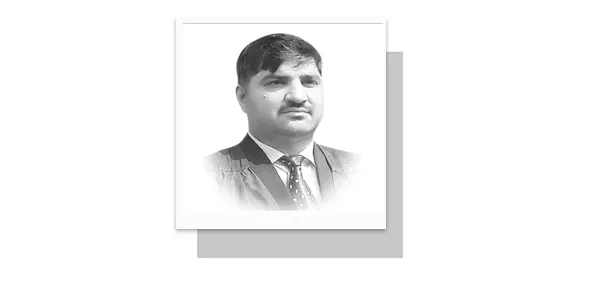THE wave of militancy and terrorism has tragically claimed lives across all walks of life, sparing not even the legal community, including lawyers and judges, who have become targets of terrorist attacks. A few instances are cited here. Tehrik-i-Taliban Pakistan (TTP) attacked former Sindh High Court Judge, Justice Maqbool Baqir, in Karachi on June 26, 2013. In this attack, nine people lost their lives and fifteen sustained injuries. Likewise, terrorist attack on Judicial Complex in F-8, Islamabad on March 3, 2014, claimed lives of eleven people, including Additional Judge Rafaqat Awan, wherein 29 people were injured. Another gruesome terrorist attack was on Judicial Complex of Peshawar on March 18, 2013 in the courtroom of Additional Judge Kulsoom Azam, killing four people and injuring 29 others. Similarly, terrorists also attached five judges in Hayatabad on their way to duty. Such kinds of terrorist attacks on legal fraternity could not deter its resolve to uphold justice and to fight against terrorism. The recent reports revealed the involvement of Afghan nationals in more than fifteen terrorist attacks . The Federal Government has taken drastic steps against illegal immigrants and set a deadline to go back to their home country. This decision of the government created great stir in civil rights activists who filed writ petitions against this decision. Seasoned politician Mr. Farhatullah Babar and his comrades from politics and civil rights filed a writ petition under Article 184 (3) of 1973 Constitution of Pakistan in the Supreme Court of Pakistan. Besides this, six faculty members of the Lahore University of Management Sciences also filed a similar writ in the SC of Pakistan. The combined pleas can be reproduced as: 1) It challenged the government’s decision to “en masse deport Afghans”; 2) It seeks orders to restrain law enforcement agencies from implementing the decision; 3) To grant citizenship to them u/s 4 of the Pakistan Citizenship Act, 1951; and lastly such decision violates provisions related to fundamental rights of the 1973 Constitution and Section 230 of the Election Act, 2017.
The answers to such petitions are quite simple. First, the Federal Government under The Foreigners Act, 1949 can declare any person as a foreigner who is not citizen of Pakistan. The Government’s decision does not affect the documented Afghan nationals except illegal immigrants including undocumented Afghan nationals. Second, The Pakistan Citizenship Act, 1951 says, “Every person born in Pakistan after the commencement of this Act shall be a citizen of Pakistan by birth”. However, it is the sole discretion of the Federal Government of Pakistan to decide the case of granting certificate of naturalization. These illegal immigrants have no such immunity. Third, under Section 5 & 5 (3) of the Naturalization Act, 1926, the Federal Government has jurisdiction to determine the fitness of the applicant for grant of such certificate and empowered the Federal Government with absolute discretion to grant a certificate of naturalization. These illegal immigrants have not been issued such certificate. Fourth, Section 14 of The Pakistan Citizenship Act, 1951 prohibits dual citizenship or nationality to Pakistan by laying down that “A citizen of Pakistan cannot carry dual citizenship. In case, if he acquires citizenship of other country, he has to submit a declaration of renouncing his Pakistani citizenship by other county.” It is astonishing that how an illegal immigrant can possess dual nationality of both Pakistan and another country simultaneously? Fifth, Pakistan is not a signatory of Geneva Convention on Refugees, 1951; so it is not bound to host refugees and not to speak of illegal foreigners. Sixth, none of the petitioners is a direct or indirect affectee of the Deportation Policy of the Government of Pakistan. Seventh, the illegal immigrants are not asylum seekers and did not apply through proper legal process; Eight, the Constitution of Pakistan protects citizens of Pakistan and lawful foreigners instead of illegal immigrants. Ninth, Pakistan has no laws pertaining to asylum/refugee. The successive governments treated such unlawful intruders under the existing laws. Tenth, the caretaker government has the mandate to take such steps as it is a national government formed by the consensus of Leader of the House (PDM) and Leader of the Opposition according to the Constitution. No doubt, its legislative mandate is restricted. However, it can exercise executive authority and responsible to implement the existing laws of the land. Eleventh, UNHCR did not recognize such illegal immigrants as refugees, so it has not extended assistance to them. Twelfth, Lastly, the Constitution demarcates the powers and functions of legislature, executive and judiciary so as to avoid any clash among these institutions and any ultra-constitutional action on the part of any institution. It is a socio-political-legal contract between the people and their government. These petitioners shall have politico-legal-constitutional repercussions and shall lead to judicial activism instead of judicial positivism. Any judicial relief shall have drastic futuristic security repercussions on the society and the State of Pakistan. In a nut shell, we must learn lessons from our past political and constitutional mistakes and avoid to repeat them in the best interest of a common citizen of Pakistan. Collective efforts are need of the hour to refrain from bulldozing the sacrifices of general public, of legal community, of political leaders and personnel of security agencies.
—Chairman, Department of Political Science, Islamia College University Peshawar.
Email: [email protected]
views expressed are writer’s own.










